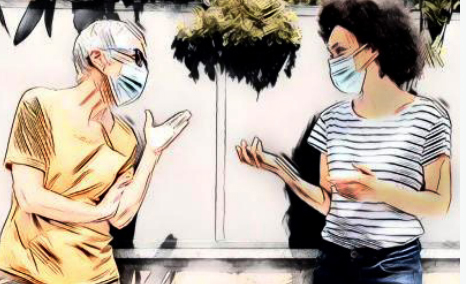Frontline News, Edition 15
April 14, 2021

HELP! MY FRIEND OR FAMILY MEMBER DOESN’T WANT TO GET VACCINATED. WHAT SHOULD I SAY?

Ask for specific reasons why they don’t want the vaccine. Knowing the specific reason why someone says they won’t get the vaccine makes it easier to address than vague generalities.
Empathize with their concerns. When responding to specific concerns, point out that many of us are scared and that many people feel uncertain. Acknowledge that we’re all coming from the same place—a place of stress and fatigue.
Share your story. Talk about your own experience getting the vaccine. Note how you aren’t just protecting yourself, but you’re protecting those around you — including those who can’t yet get the vaccine. Your personal story can communicate faith, hope and honesty.
Don’t argue. Whether you’re someone face-to-face or through social media with someone, don’t argue. You don’t want people to feel defensive. Posting on their feed “You are wrong” won’t help your case.
Again, figure out what their concerns are. Acknowledge that it’s normal to feel concerned in the midst of a pandemic. Then address their specific concerns and share your own reasons for getting the vaccine.
Move discussions offline. The majority of people who spread COVID-19 vaccine misinformation—either online or in person—do so because they’re scared the vaccine is going to harm them or their family, or that it won’t work. That’s a hard thing to address because the belief has usually been building a while.
Try having a private conversation in person or on the phone. Communication comes across differently when you put it in writing, especially when it’s public. It’s hard to take something back, and it’s easy to have something misconstrued. Attitudes harden and feelings get hurt.
Replace myths with facts. First, find out if it’s the COVID-19 vaccine they’re hesitant about, or all vaccines.
If it’s the COVID-19 vaccine specifically, it may be a matter of clarifying some misconceptions.
You don’t need to present formal research studies to correct misinformation. For facts about COVID-19 vaccines, visit https://www.1199seiubenefits.org/vaccines/ or https://www.1199seiu.org/covid19vaccineresources.
If someone is opposed to all vaccines, not just the COVID-19 vaccine, communication becomes much more difficult. Go back to their specific concerns. Can you address them? Can you share your story? If you’re communicating with someone who doesn’t trust government health sources or public health sources, find reputable sources they do trust, such as religious organizations, the Union, or community leaders. Present credible information from those sources. You may not convince someone that vaccination is in their best interest right away, but you may reach a point where they’re willing to think about it. That’s half the battle.
QUESTION OF THE WEEK
Q: Why was the Johnson and Johnson vaccine paused?
A: The Centers for Disease Control and Prevention (CDC) and the Food and Drug Administration on April 13 halted use of the one-dose Johnson & Johnson (J&J) COVID-19 vaccine that has been given to over 7 million people in the U.S. The pause, implemented out of an abundance of caution according to FDA and CDC officials, is due to reports of blood clotting in six people who received the vaccine. Among the nearly 7 million doses of the J&J vaccine administered, all six cases occurred in women ages 18-48, and from 6 to 13 days after vaccination. A recent article in The New York Times pointed out that the chances of actually contracting COVID-19 are much higher than the incidence of the potential J&J side effect. After an April 14 meeting of the Advisory Committee on Immunization Practices (ACIP), the CDC announced a continuation of the pause because more time was needed to assess data and risks. While mild headaches and flu like symptom the first few days after vaccination are common side effects triggered by the immune system’s defense against the coronavirus, people who develop severe headache, abdominal pain, leg pain, and shortness of breath, within three weeks of receiving the J&J vaccine should seek medical attention.

